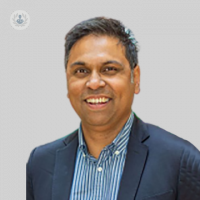Thyroid surgery: an expert's explanation
Written by:Thyroid surgery, also known as thyroidectomy, is a procedure that involves the removal of all or part of the thyroid gland. The thyroid gland is a butterfly-shaped organ located in the front of the neck that produces hormones that regulate metabolism, growth, and development. Renowned consultant ENT Surgeon Mr Sid Nagala explains more about the surgery.

How is thyroid surgery performed?
Thyroid surgery is usually performed under general anaesthesia, which means you will be asleep and not feel any pain. The surgeon makes an incision in the lower part of your neck to access the thyroid gland. Depending on the reason for the surgery, the surgeon may remove:
- The entire thyroid gland (total thyroidectomy)
- One lobe of the thyroid gland and the isthmus (the bridge of tissue connecting the two lobes) (lobectomy or hemithyroidectomy)
The surgeon may also remove some of the lymph nodes around the thyroid gland if they are affected by cancer or inflammation. The incision is then closed with stitches or surgical glue. The surgery usually takes one to two hours.
When and why might thyroid surgery be considered?
Your doctor may recommend that you consider thyroid surgery for four main reasons:
- You have a nodule that might be thyroid cancer or you have a diagnosis of thyroid cancer.
- You have a nodule or goiter (an enlarged thyroid gland) that is causing local symptoms, such as difficulty swallowing, breathing, or speaking, or a visible or unsightly mass in your neck.
- You have a nodule or goiter that is producing too much thyroid hormone (hyperthyroidism) and you cannot or do not want to take medications or radioactive iodine to treat it.
- You have a nodule or goiter that is suspicious for malignancy based on biopsy results or imaging tests.
What are the main associated risks?
Thyroid surgery is generally safe and effective, but as with any surgery, it carries some risks. The most common risks are:
- Bleeding: This can occur during or after the surgery and may require additional surgery to stop it. Sometimes bleeding can block your airway, making it hard to breathe.
- Infection: This can occur at the site of the incision or in the deeper tissues and may require antibiotics to treat it.
- Excessive scarring: This is rare as most scars on the neck heal well
- Low parathyroid hormone levels (hypoparathyroidism): This can occur if the surgery damages or removes the parathyroid glands, which are four small glands located behind the thyroid gland that control calcium levels in the blood. Low calcium levels can cause symptoms such as numbness, tingling, muscle spasms, and seizures. This condition may be temporary or permanent and may require calcium and vitamin D supplements to treat it.
- Vocal cord paralysis: This can occur if the surgery damages the recurrent laryngeal nerves, which are nerves connected to your vocal cords. This can cause hoarseness, voice changes, difficulty swallowing, and breathing problems. This condition may improve over time or may require further treatment such as speech therapy or surgery.
Might I need to undergo thyroid surgery more than once?
In most cases, one thyroid surgery is enough to treat your condition. However, in some rare cases, you may need to undergo another surgery if:
- You may require a completion thyroidectomy if a hemithyroidectomy showed cancer.
- You develop recurrent or persistent thyroid cancer after a total thyroidectomy.
- You develop complications from the first surgery that require revision or correction.
Can thyroid surgery cure thyroid cancer?
Thyroid surgery is often the main treatment for most types of thyroid cancer. It can cure most cases of papillary and follicular thyroid cancer, which are the most common and least aggressive types. However, some cases of these cancers may recur or spread to other parts of the body and require additional treatments such as radioactive iodine therapy, external beam radiation therapy, chemotherapy, or targeted therapy.
For more aggressive types of thyroid cancer, such as medullary and anaplastic thyroid cancer, surgery alone may not be enough to cure them. These cancers may also require other treatments such as radiation therapy, chemotherapy, targeted therapy, or immunotherapy.
If you would like to book a consultation with Mr Nagala, simply visit his Top Doctors profile today.


